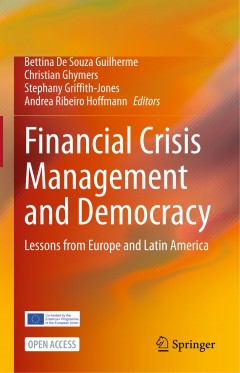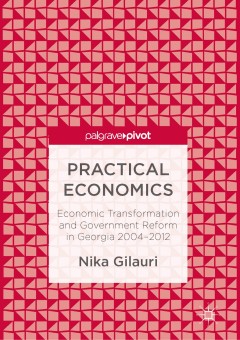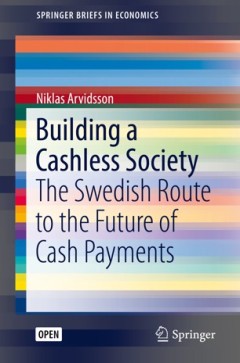Filter by

Financial crisis management and democracy : lessons from Europe and Latin Ame…
This open access book discusses financial crisis management and policy in Europe and Latin America, with a special focus on equity and democracy. Based on a three-year research project by the Jean Monnet Network, this volume takes an interdisciplinary, comparative approach, analyzing both the role and impact of the EU and regional organizations in Latin America on crisis management as well as t…
- Edition
- -
- ISBN/ISSN
- 9783030548957
- Collation
- ix, 382p. : ill.
- Series Title
- -
- Call Number
- 339 FIN f

Stochastic discounted cash flow : a theory of the valuation of firms
This open access book discusses firm valuation, which is of interest to economists, particularly those working in finance. Firm valuation comes down to the calculation of the discounted cash flow, often only referred to by its abbreviation, DCF. There are, however, different coexistent versions, which seem to compete against each other, such as entity approaches and equity approaches. Acronyms …
- Edition
- -
- ISBN/ISSN
- 9783030370817
- Collation
- xxii, 241p. : ill.
- Series Title
- -
- Call Number
- 339 KRU s

Determinants of financial development
As the world has witnessed the worst financial crisis and climate crisis of our age, during the period of 2007-2009, the issues surrounding the emergence and development of financial markets and carbon markets is becoming an increasingly significant area of research and debate worldwide. By engaging with recently developed methods of research and new areas of practice, this book investigates th…
- Edition
- -
- ISBN/ISSN
- 9780230302495
- Collation
- xix, 206p. : ill.
- Series Title
- -
- Call Number
- 332.042 HUA d

Practical economics : economic transformation and government reform in Georgi…
In this book, Nika Gilauri reveals his formulas for government reform and economic recovery, including how to fight against corruption, reform fiscal policy and tax systems, privatize state-owned enterprises, build a welfare system for those most in need, create a competitive education and healthcare system, and streamline procurement. All formulas are corroborated by practical experience and e…
- Edition
- -
- ISBN/ISSN
- 9783319457697
- Collation
- xv, 213p. : ill.
- Series Title
- -
- Call Number
- 330.94758 GIL p

The economy as a complex spatial system : macro, meso and micro perspectives
This collected volume represents the final outcome of the COST Action IS1104 “The EU in the new complex geography of economic systems: models, tools and policy evaluation”. Visualizing the EU as a complex and multi-layered network, the book is organized in three parts, each of them dealing with a different level of analysis: At the macro-level, Part I considers the interactions within la…
- Edition
- -
- ISBN/ISSN
- 9783319656274
- Collation
- xii, 220p. : ill.
- Series Title
- -
- Call Number
- 330.9 ECO e

Building a cashless society : the Swedish route to the future of cash payments
This open access book tells the story of how Sweden is becoming a virtually cashless society. Its goal is to improve readers’ understanding of what is driving this transition, and of the factors that are fostering and hampering it. In doing so, the book covers the role of central banks, political factors, needs for innovation, and the stakeholders involved in developing a cashless ecosystem. …
- Edition
- -
- ISBN/ISSN
- 9783030106898
- Collation
- x, 96p. : ill.
- Series Title
- -
- Call Number
- 332.409485 ARV b
 Computer Science, Information & General Works
Computer Science, Information & General Works  Philosophy & Psychology
Philosophy & Psychology  Religion
Religion  Social Sciences
Social Sciences  Language
Language  Pure Science
Pure Science  Applied Sciences
Applied Sciences  Art & Recreation
Art & Recreation  Literature
Literature  History & Geography
History & Geography